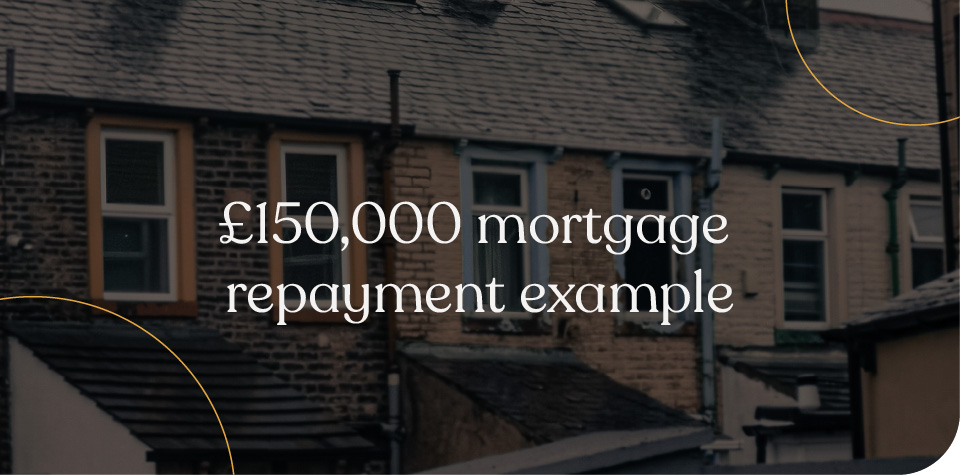
£150,000 mortgage repayment example – Mortgage payments on a £150k loan size
This article will explain what your mortgage payments could be for a £150,000 mortgage loan, how much deposit you’ll require for a £150,000 mortgage, and how to get the best interest rates for a £150,000 mortgage.
Take a look at the mortgage repayment calculator to get an idea of the monthly repayment cost of a mortgage for this amount.
Get started online
We receive enquiries about mortgages up to this amount daily. Our mortgage brokers are all-market and best equipped to help find the best mortgage deals for you. We provide mortgage advice free of charge.
What is the monthly cost of a £150,000 mortgage?
Customers frequently ask us “What are the average monthly repayments for a £150K mortgage?”. The answer is dependent on many factors. Your credit history will impact the interest rate you pay. This will also affect the number of your monthly mortgage repayments.
Monthly repayments for a £150K mortgage will depend on the interest rate and the length of the term.
Below is an example of how £150k mortgage payments could differ depending on these variables.
The mortgage rate that you are eligible for will depend on how much deposit you have and what your profile is as a borrower.
Contact us if you have any questions about the cost of a £150,000 Mortgage.
Our expert advisors will provide you with mortgage quotes based on your circumstances. They will also connect you to the most favourable rates.
We are expert mortgage brokers
We have access to over 200+ lenders in the UK to get you the best rates
Get your Quote
Is the term of your mortgage affecting the monthly repayments?
The short answer to that question is yes. It is often asked what the mortgage repayments are for a 150,000 mortgage.
It all depends on your financial situation and how much you are able to afford each month.
The following table shows how reducing your mortgage term will impact your monthly payments and your total amount to repay for the mortgage deal. It is based on an average interest rate of 3%.
As you can see, the term of your mortgage significantly impacts how much you end up paying and the monthly payments you make.
A mortgage with a 20-year term instead of a 25-year term can save you more than £13,700.
Talk to one of our mortgage advisors for expert advice about which term is best for you. They can provide you with specific mortgage quotes based on your financial situation.
Get started online
What amount of income do you require?
We are often asked how much income we need to get a £150,000 mortgage. This depends on many factors, such as where you earned your income, your credit history, and how much you deposit.
The answer may be more complicated or simpler depending on your circumstances.
For more information, see our article below; how much should you earn to get a mortgage to purchase a £150,000 home?
What is the minimum deposit?
The amount you are willing to borrow is proportional to the property’s value. This is called the loan-to-value (LTV) ratio.
You can borrow 90% if you have a £15,000 down payment on a £150,000 property. Your LTV ratio will be 90%.
For residential mortgages, the minimum deposit required is currently 5% or 95% LTV. For a 150,000 mortgage, you will need to have a minimum deposit of £7.5K.
Is it possible to get a £150,000K loan without putting down a deposit?
100% mortgages are available. However, these are usually limited to family loans in which a relative, often parents, deposits the equivalent of the deposit into a mortgage lender account as security.
They can return their money after a certain period, often three years, if they meet certain criteria.
You may also be able to borrow money from the government’s Help To Buy scheme or Shared Ownership if you have trouble getting a deposit.
How does bad credit impact the amount of deposit required for a £150k mortgage loan?
The short answer to this question is yes. Mortgage providers will consider you a higher risk if you have bad credit. Therefore, a larger deposit is required.
Credit problems may include…
- Credit history is required
- Credit score low
- Late payments
- Mortgage payments not made
- Defaults
- CCJs
- IVAs
- Debt management plan
- Repossessions
- Bankruptcy
- Payday loans
- Multiple credit problems
Depending on your situation and how you access the risk, different mortgage lenders may require different deposits or loan-to-value.
Some lenders will accept a lower deposit and a higher LTV if you have relatively good credit.
However, if you have a credit history that includes serious issues, such as repossession, other debts and bankruptcy, then the lender may require a higher deposit to ensure a lower LTV. This means lower risk. Payday loans are a risky option. It’s usually harder to get a mortgage if you have payday loan use in your file.
Depending on the lender’s perceived risk, you may need to deposit a higher amount.
This is a demonstration only. It would help if you spoke to your mortgage broker such as Loan Corp for current rates and information.
This article will touch more on bad credit history. However, if you are unsure whether your credit history will pose a problem, speak to one of our advisors today, as they are experts in finding mortgages for customers with bad credit.
Get started online
Can you get a £150,000 buy-to-let mortgage?
Yes. However, buy-to-let mortgages can have different rules. It’s essential to be aware of these differences before you begin.
While some mortgage providers require a larger deposit, such as 25%, others will accept 15% subject to certain criteria. Some providers may require a minimum income of around £25k.
However, affordability comes down to whether your forecast rental income can cover mortgage repayments by 125-130%.
Lenders may not offer you a buy-to-let deal if your home has been owned for less than six months. However, specialist providers may be able to consider first-time buyers if other criteria are met.
Most buy-to-let mortgages are set up on an interest-only basis. See the section below to see examples of monthly payments for a £150,000 mortgage.
Is it possible to get a £150,000 interest-only mortgage?
Yes, there are many providers that offer these products to residential borrowers who have a viable and valid repayment strategy.
You will need to deposit slightly more to be eligible for an interest-only mortgage. Most lenders will only accept up to 75% loan to value (LTV). A few lenders will consider up to 80% and a few up to 85% depending on the circumstances.
Repayment agreements can be more beneficial than interest-only mortgages, since you reduce the amount owed each month.
An interest-only agreement allows the borrower to pay only the interest each month, but then they must pay off the entire loan amount at the end. Repayments allow you to pay off the loan as you go.
Below is a table that compares mortgage payments on a £150,000 loan based on interest-only vs repayments based on 4.4% interest.
Send an enquiry today. Our experts will give you this information over the telephone and help you connect with the right mortgage lender to find the best mortgage deal for you.
Get started online
Other factors that could affect a £150,000 mortgage application
Your credit rating and other factors (see above) may play a role in whether your £150,000 mortgage application is approved.
Type of property
Some mortgage lenders do not accept non-standard construction. Some lenders won’t lend on properties with non-standard construction (e.g. thatched roof, timber frame), while others will. Learn more about non-standard construction mortgages.
Your age
Some mortgage providers place age restrictions and won’t lend money to anyone older than 75. Others have 85 as a maximum. A minority of providers won’t impose an upper age limit on their mortgages if they are confident that you can pay the repayments after retirement.
Type of income
Lenders are most attracted to those with high-paying PAYE salaries from full-time jobs. Anything else falls under the non-standard category, leading to higher rates of interest.
Some lenders specialise in self-employed mortgages. They also offer mortgages with bonus income or commission. Additionally, mortgage lenders will accept benefits as additional income. Learn more about income types and mortgages.
No matter if you have property already
Some lenders may consider you a higher risk if you are a homeowner and you plan to buy a second property. There may be additional income requirements and a higher deposit requirement. Additionally, there might be more scrutiny about mortgage affordability.
Credit rating
Bad credit is not necessarily a problem.
This depends on the issue’s severity (missed phone bill payments are less severe than recent bankruptcy) and how long the issue has been on your file (the longer the better).
Customers with bad credit may need a specialist lender with more understanding of their situation. Whole-of-market advice can be very important.
£150,000 mortgages for self-employed borrowers
You can get a mortgage even if you are self-employed. However, you will need to work with a specialist lender to get the best rates. Some lenders will not consider your income standard and offer you a lower rate because of the perceived risk.
The most common income lenders accept is…
- EmployedBonus – Overtime – Commission – Car/Town/Shift Allowances – Mortgage Subsidy – Other Cash Employer Benefits
- Solo Trader: Net Profit (if using accounts) and Total Income (if using SA302s).
- Partnership: Your share of net profit (if you use accounts) – Your share in total income (if you use SA302s).
- Ltd Company – Your share in director’s salaries – Your share in dividends – Lenders may consider net profit when there have been large business expenses or a sum left in the company.
Most lenders require that self-employed borrowers provide evidence of three years worth of accounts for a mortgage. However, some will accept only two years, while a few others will accept up to three. Learn more about mortgages for the self-employed.
Get started online
£150,000 secured loan vs £150,000 mortgage?
Secured loans, also known as second-charge mortgages and homeowner loans, can be a viable option to property owners who need capital but are unable or unwilling to remortgage.
You can get a £150,000 homeowner loan secured on your property. However, you must meet the lender’s eligibility requirements. Income, adverse credit, and non-standard income are less restrictive than LTV requirements.
Secured loans are often as affordable as conventional mortgages. They can also be quicker to arrange and have no fees for early settlement.
Where can I find a £150,000 calculator for a mortgage?
You can use this calculator below:
Take a look at other mortgage repayment examples:
- £120,000 mortgage repayments example
- £180,000 mortgage repayments example
- £200,000 mortgage repayments example
- £300,000 mortgage repayments example
- £350,000 mortgage repayments example
- £400,000 mortgage repayments example
- £450,000 mortgage repayments example
- £500,000 mortgage repayments example
Talk to an expert mortgage broker
Are you still wondering, “Can I afford a £150k mortgage?”
We will match you with one of our expert brokers. They’ll be happy to answer any questions and help you find the right mortgage at the best rate.
Get started online
